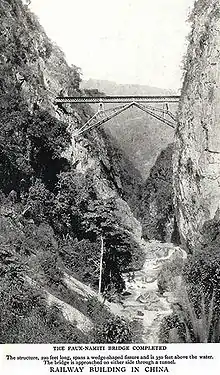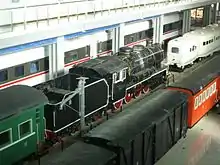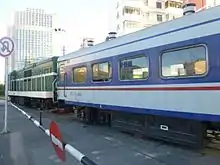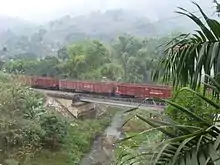Kunming–Haiphong railway
The Yunnan–Haiphong railway (Chinese: 滇越铁路; pinyin: Diānyuè Tiělù; Vietnamese: tuyến đường sắt Hải Phòng – Vân Nam/ 綫塘鐵海防-雲南; French: Chemins de Fer de L'Indo-Chine et du Yunnan, "Indo-China–Yunnan Railroad") is an 855 km (531 mi) railway built by France during 1904–1910, connecting Haiphong, Vietnam, with Kunming, Yunnan province, China. The section within China from Kunming to Hekou is known as the Kunming–Hekou railway (Chinese: 昆河铁路; pinyin: Kun–He tielu), and is 466 km long. The section within Vietnam is 389 km (242 mi) long, and is known as the Hanoi–Lào Cai railway (Vietnamese: Đường sắt Hà Nội – Lào Cai/ 塘鐵河内-老街). The railway was built with 1,000 mm (3 ft 3 3⁄8 in) gauge due to the mountainous terrain along the route. Currently it is the only main line in China using 1,000 mm (3 ft 3 3⁄8 in) metre gauge.

Yunnan–Vietnam Railway | |||||||||||||||||||||||||||||||||||||||||||||||||||||||||||||||||||||||||||||||||||||||||||||||||||||||||||||||||||||||||||||||||||||||||||||||||||||||||||||||||||||||||||||||||||||||||||||||||||||||||||||||||||||||||||||||||||||||||||||||||||||||||||||||||||||||||||||||||||||||||||||||||||||||||||||||||||||||||||||||||||||||||||||||||||||||||||||||||||||||||||||||||||||||||||||||||||||||||||||||||||||||||||||||||||||||||||||||||||||||||||||||||||||||||||||||||||||||||||||||||||||||||||||||||||||||||||||||||||||||||||||||||||||||||||||||||||||||||||||||||||||||||||||||||||||||||||||||||||||||||||||||||||||||||||||||||||||||||||||||||||||||||||||||||||||||||||||||||||||||||||||||||||||||||||||||||||||||||||||||||||||||||||||||||||||||||||||||||||||||||||||||||||||||||||||||||||||||||||||||||||||||||||||||||||||||||||||||||||||||||||||||||||||||||||||||||||||||||||||||||||||||||||||||||||||||||||||||||||||||||||||||||||||||||||||||||||||||||||||||||||||||||||||||||||||||||||||||||||||||
|---|---|---|---|---|---|---|---|---|---|---|---|---|---|---|---|---|---|---|---|---|---|---|---|---|---|---|---|---|---|---|---|---|---|---|---|---|---|---|---|---|---|---|---|---|---|---|---|---|---|---|---|---|---|---|---|---|---|---|---|---|---|---|---|---|---|---|---|---|---|---|---|---|---|---|---|---|---|---|---|---|---|---|---|---|---|---|---|---|---|---|---|---|---|---|---|---|---|---|---|---|---|---|---|---|---|---|---|---|---|---|---|---|---|---|---|---|---|---|---|---|---|---|---|---|---|---|---|---|---|---|---|---|---|---|---|---|---|---|---|---|---|---|---|---|---|---|---|---|---|---|---|---|---|---|---|---|---|---|---|---|---|---|---|---|---|---|---|---|---|---|---|---|---|---|---|---|---|---|---|---|---|---|---|---|---|---|---|---|---|---|---|---|---|---|---|---|---|---|---|---|---|---|---|---|---|---|---|---|---|---|---|---|---|---|---|---|---|---|---|---|---|---|---|---|---|---|---|---|---|---|---|---|---|---|---|---|---|---|---|---|---|---|---|---|---|---|---|---|---|---|---|---|---|---|---|---|---|---|---|---|---|---|---|---|---|---|---|---|---|---|---|---|---|---|---|---|---|---|---|---|---|---|---|---|---|---|---|---|---|---|---|---|---|---|---|---|---|---|---|---|---|---|---|---|---|---|---|---|---|---|---|---|---|---|---|---|---|---|---|---|---|---|---|---|---|---|---|---|---|---|---|---|---|---|---|---|---|---|---|---|---|---|---|---|---|---|---|---|---|---|---|---|---|---|---|---|---|---|---|---|---|---|---|---|---|---|---|---|---|---|---|---|---|---|---|---|---|---|---|---|---|---|---|---|---|---|---|---|---|---|---|---|---|---|---|---|---|---|---|---|---|---|---|---|---|---|---|---|---|---|---|---|---|---|---|---|---|---|---|---|---|---|---|---|---|---|---|---|---|---|---|---|---|---|---|---|---|---|---|---|---|---|---|---|---|---|---|---|---|---|---|---|---|---|---|---|---|---|---|---|---|---|---|---|---|---|---|---|---|---|---|---|---|---|---|---|---|---|---|---|---|---|---|---|---|---|---|---|---|---|---|---|---|---|---|---|---|---|---|---|---|---|---|---|---|---|---|---|---|---|---|---|---|---|---|---|---|---|---|---|---|---|---|---|---|---|---|---|---|---|---|---|---|---|---|---|---|---|---|---|---|---|---|---|---|---|---|---|---|---|---|---|---|---|---|---|---|---|---|---|---|---|---|---|---|---|---|---|---|---|---|---|---|---|---|---|---|---|---|---|---|---|---|---|---|---|---|---|---|---|---|---|---|---|---|---|---|---|---|---|---|---|---|---|---|---|---|---|---|---|---|---|---|---|---|---|---|---|---|---|---|---|---|---|---|---|---|---|---|---|---|---|---|---|---|---|---|---|---|---|---|---|---|---|---|---|---|---|---|---|---|---|---|---|---|---|---|---|---|---|---|---|---|---|---|---|---|---|---|---|---|---|---|---|---|---|---|---|---|---|---|---|---|---|---|---|---|---|---|---|---|---|---|---|---|---|---|---|---|---|---|---|---|---|---|---|---|---|---|---|---|---|---|---|---|---|---|---|---|---|---|---|---|---|---|---|---|---|---|---|---|---|---|---|---|---|---|---|---|---|---|---|---|---|---|---|---|---|---|---|---|---|---|---|---|---|---|---|---|---|---|---|---|---|---|---|---|---|---|---|---|---|---|---|---|---|---|---|---|---|---|---|---|---|---|---|---|---|---|---|---|---|---|---|---|---|---|---|---|---|---|---|---|---|---|---|---|---|---|---|---|---|---|---|---|---|---|---|---|---|---|---|---|---|---|---|---|---|---|---|---|---|---|---|---|---|---|---|---|---|---|---|---|---|---|---|---|---|---|---|---|---|---|---|---|---|---|---|---|---|---|---|---|---|---|---|---|---|---|---|---|---|---|---|---|---|---|---|---|---|---|---|---|---|---|---|---|---|---|---|---|---|---|---|---|---|---|---|---|---|---|---|---|---|---|---|---|---|---|---|---|---|---|---|---|---|---|---|---|---|---|---|---|---|---|---|---|---|---|---|---|---|---|---|---|---|---|---|---|---|---|---|---|---|---|---|---|---|---|---|---|---|---|---|---|---|---|---|---|---|---|---|---|---|---|---|---|---|---|---|---|---|---|---|---|---|---|---|---|---|---|---|---|---|---|---|---|---|---|---|---|---|---|---|---|---|---|---|---|
| |||||||||||||||||||||||||||||||||||||||||||||||||||||||||||||||||||||||||||||||||||||||||||||||||||||||||||||||||||||||||||||||||||||||||||||||||||||||||||||||||||||||||||||||||||||||||||||||||||||||||||||||||||||||||||||||||||||||||||||||||||||||||||||||||||||||||||||||||||||||||||||||||||||||||||||||||||||||||||||||||||||||||||||||||||||||||||||||||||||||||||||||||||||||||||||||||||||||||||||||||||||||||||||||||||||||||||||||||||||||||||||||||||||||||||||||||||||||||||||||||||||||||||||||||||||||||||||||||||||||||||||||||||||||||||||||||||||||||||||||||||||||||||||||||||||||||||||||||||||||||||||||||||||||||||||||||||||||||||||||||||||||||||||||||||||||||||||||||||||||||||||||||||||||||||||||||||||||||||||||||||||||||||||||||||||||||||||||||||||||||||||||||||||||||||||||||||||||||||||||||||||||||||||||||||||||||||||||||||||||||||||||||||||||||||||||||||||||||||||||||||||||||||||||||||||||||||||||||||||||||||||||||||||||||||||||||||||||||||||||||||||||||||||||||||||||||||||||||||||||
History

In the 19th century, the French colonial administration worked to develop regular trading networks and an efficient transport infrastructure between Indochina and south-west China. The primary motivation for such an effort was to facilitate export of European goods to China.[4] A railway would also give France access to Yunnan's natural resources, mineral resources and opium, and open up the Chinese market for Indochinese products such as rice, dry fish, wood and coal.[4]
Before the railway was built, the standard travel time from Haiphong (the closest sea port to most of Yunnan) to Kunming was reckoned by the Western authorities to be 28 days: 16 days by steamer and then a small boat up the Red River to Manhao (425 miles), and then 12 days overland (194 miles).[5]

The right to build the railway was obtained following China's defeat in the First Sino-Japanese War (1894–95). At a cost of 95 million francs (€362 million), the railway was among the most ambitious colonial projects undertaken by France, and was put into use on 1 April 1910.[4][6] The 1,000 mm (3 ft 3 3⁄8 in) metre gauge section was originally administered in more or less the same way as the Indochinese networks, and if not for a "missing link" through Cambodia (between Saigon and Phnom Penh), it would have been physically possible for through trains to run from Kunming to Singapore, as 1,000 mm (3 ft 3 3⁄8 in) metre gauge was used in Malaya as well.
Under pressure from Japan, France closed the line on 16 July 1940 to cut supplies to China during the Second Sino-Japanese War. During the Japanese occupation Japanese National Railways Class 9600 2-8-0 locomotives were shipped to aid their invasion, and after the completion of the "death railway" it was possible for a time to send through traffic to Burma and hence to the Indian 1,000 mm (3 ft 3 3⁄8 in) metre gauge network. This is now not possible, as sections of the railway were destroyed during the conflicts since World War II.[7]
During the Sino-Vietnamese War of 1979, the railway bridge across the Nanxi River at the two countries' border was destroyed, and the trade between China and Vietnam came to a halt for several years.[8]
Gebishi railway
The 600 mm (1 ft 11 5⁄8 in) narrow-gauge Gebishi branch line was built from Bisezhai towards Shiping and was 176 kilometres (109 mi) long. It was constructed in 1915 and the last 72 kilometres (45 mi) part was closed in 1990.
Present state


Twice-a-week cross-border passenger service operated as late as 2000; the second-class passengers had to transfer from a Chinese train to a Vietnamese train at the border station, while the first-class car passengers could remain on board as their car was transferred to the train across the border. However, landslides caused frequent delays.[9] Eventually, in 2005[10] the passenger service on the Chinese section of the railway (the Kunming–Hekou railway) was terminated,[11] [12] and most of the passenger coaches were donated to Myanmar.[10]
In 2008, passenger service on a small part (37 km long) of the Chinese section of the railway was resumed, but on a very limited scale. As of 2012, two daily trains ran from Kunming North railway station on the meter-gauge tracks to Shizui (石咀) Station on the western outskirts of Kunming, and to Wangjiaying (王家营) east of the city.[10] As of 2016, this service still continues, with 2 daily trains to Wangjiaying and one to Shizui.[13] In December 2017, in order to leave room for the construction of the Kunming No.4 Metro line, the commuter train service between Shizui and Wangjiaying was terminated again, and parts of the meter gauge railway in the urban area was demolished.
Freight service continues to operate throughout the Kunming–Hekou railway.[11] Some rolling stock continues to be maintained in working condition. According to a 2015 news report, over the seven preceding years, 63-metre-gauge flatcars had been refurbished at the Kunming North Station's workshop, for use in transborder container shipping.[14] In 2016, 100 mothballed freight railcars were selected to be refurbished at the Kaiyuan workshop and to be put into use again.[15]
Among important cargo types moved internationally on this line are chemical fertilizers.[14] Since 2015, direct trains have been run from the phosphate fertilizer manufacturers in Kaiyuan to consumers in Vietnam.[16][17] In the opposite direction, sulphur and zinc ore concentrate are imported to China from Vietnam.[17]
The overall role of the Kunming–Hekou meter-gauge line in the Sino-Vietnamese trade significantly declined in the 21st century, as compared to the railway's heyday in the first half of the 20th century. According to one article dated 2015 and describing the trade as it operated prior to the opening of the standard-gauge railway to Hekou in 2014 (see below), the most common route for cargo shipped from Kunming to Vietnam would be the rather circuitous one: via the Nanning–Kunming railway (opened 1997), the sea port of Fangchenggang, and then by ship to Haiphong.[18] However, since 2015, the amount of transborder shipments on the meter-gauge line has been on the increase again.[15][17] According to a 2017 report, the first quarter of 2017 saw 166,200 tons of freight shipped by rail on the transborder line, which represented a 66.2% increase from the same period of the previous year, and 12-year record.[17] This consisted of 74,100 tons of fertilizers exported from China to Vietnam and 92,100 tons of sulphur and zinc ore concentrate imported to China from Vietnam.[17]
On the Vietnamese side, the Hanoi–Haiphong and Hanoi–Lào Cai railways continue to be important for domestic and transborder cargo transportation. Passenger trains continue to run both from Hanoi to Haiphong and from Hanoi to the border town of Lào Cai.[11][12]
The new Kunming–Hekou railway line
A new 1,435 mm (4 ft 8 1⁄2 in) standard gauge railway line from Kunming toward the Vietnamese border (the Kunming–Yuxi–Hekou railway) has been constructed in several stages between the 1990s and the 2010s. Its first section, a railway branch from Kunming to Yuxi, was opened in 1993.[19] The new Yuxi–Mengzi section opened for freight service in February 2013; in April 2013, passenger trains started running daily as far as Mengzi North, 258 km (160 mi) south of Kunming and approximately 150 km north of Hekou. A second daily train was added by July.[19]
The Mengzi–Hekou section was opened in December 2014, and regular passenger service started between Hekou North railway station and Kunming, with some trains continuing to Dali.[20]
Although the new Kunming–Yuxi–Mengzi–Hekou rail line roughly parallels the old Kunming–Haiphong railway, the routes of the two railways are significantly different: the new rail line, passing through Tonghai and Jianshui, is about 30 km (19 mi) west of the old 1,000 mm (3 ft 3 3⁄8 in) metre gauge railway (which runs via Yiliang and Kaiyuan).[19]
Connections to standard-gauge network
There are a few points where the Kunming–Haiphong railway comes into contact with the standard-gauge network, enabling transfer of freight between the narrow-gauge and standard-gauge trains.
In Vietnam, the Hanoi metropolitan area has standard-gauge access via the dual-gauge (meter and standard) line that runs from Hanoi's Gia Lâm railway station to the Chinese (Guangxi) border at Đồng Đăng; this is the line that enables direct standard-gauge connection between Hanoi and China.
At the narrow-gauge railway's northern end, Kunming, is served both by the meter-gauge railway and by standard-gauge railways. There is even a level-crossing between the tracks of different gauges.[21]
A short meter-gauge connector line has been constructed between the new Hekou North railway station (the southern terminal of the new standard-gauge line) and the old meter-gauge railway, thus allowing to bring cargo from Vietnam on meter-gauge railcar for reloading to standard-gauge rolling stock, and vice versa.[18] The short connecting line joins the Kunming–Haiphong narrow-gauge mainline at 22.514674°N 103.986049°E, a few kilometers from the old Hekou Station.
A similar connection between the narrow-gauge and standard-gauge network exist in Mengzi,[18] where the narrow-gauge Yuguopo railway station (雨过铺站) on the Caoba–Guanjiashan branch is adjacent to the standard-gauge Mengzi North railway station (蒙自北站) on the Kunming–Yuxi–Hekou line.
Museums and memorials

The Yunnan Railway Museum, at Kunming North railway station, has a large exhibit on the Kunming–Haiphong railway and its narrow-gauge branch lines within Yunnan, although it covers the history of the province's standard gauge railways as well.
At Hekou, the square outside of the new Hekou North railway station (opened 2014) is decorated with reliefs depicting the history of the transportation and economy in the region, with a special focus on the Kunming–Haiphong railway.
In fiction
- Bisezhai Station (碧色寨) by Fan Wen (范稳).[22]
See also
 Railways portal
Railways portal- China Railways DFH21 (aka DF10H), main motive power on the railway in the latter quarter of the 20th century
- Ethio-Djibouti Railways, a similar French-designed meter-gauge railway in Africa
- Guangzhouwan
- Hanoi–Haiphong railway
- Hanoi–Lào Cai railway
- History of rail transport in China
- List of former foreign enclaves in China
- Nanning–Kunming Railway (opened 1997), the main modern link between Yunnan and China's ports on the Tonkin Gulf
- Narrow gauge railways in China
- Yunnan–Burma Railway, an abortive project abandoned during World War II
Notes
- 13 tunnels between Kebao and Yiliang.
- 5 tunnels between Nuozu and Xi’er.
- 6 tunnels between Xicheyi and Xunjiansi.
- 4 tunnels between Xiaolongtan and Kaiyuan.
- 11 tunnels between Kaiyuan and Dazhuang.
- 27 tunnels between Luogu and Boduqing.
- 4 tunnels between Boduqing and Wantang.
- 6 tunnels between Baizhai and Lahadi.
References
- Nami-Ti Railway Bridge
- Hulot, Frédéric (1990), Les chemins de fer de la France d'outre-mer, 1: L'Indochine – Le Yunnan, Saint-Laurent-du-Var 1990, pp. 28, 39, ISBN 978-2-906984-05-9CS1 maint: location (link)
- Schmidt, Florian (1989), "Vietnam. Eisenbahn zwischen Mekong und Rotem Fluss", Dampf und Reise / Überseeische Eisenbahnen (6): 9, 18
- Rousseau, Jean-François (June 2014). "An Imperial Railway Failure: The Indochina-Yunnan Railway, 1898–1941". Journal of Transport History. 35 (1): 1–17. doi:10.7227/TJTH.35.1.2. S2CID 111066738 – via Questia.
- Whates, H. (1901), The Politician's Handbook, Vacher & Sons, p. 146
- Davis, Clarence B.; Wilburn, Kenneth E., Jr; Robinson, Ronald E. (1991). "Railway Imperialism in China, 1895–1939". Railway Imperialism. Westport, Connecticut: Greenwood Press. p. 159. ISBN 9780313259661. Retrieved 11 August 2015 – via Questia.
- A Picture Album of Steam Locomotives in China, 1876–2001. China Rail Publishing House. ISBN 7-113-04147-7.
- Middleton, William D. (2000), Yet There Isn't a Train I Wouldn't Take: Railway Journeys, Railroads Past and Present Series, Indiana University Press, p. 189, ISBN 0253336996
- "This Train Beats Walking (Sometimes)" New York Times, 3 December 2000
- 滇越铁路徒步第一程(昆明——宜良) (A walk along the Kunming-Vietnam Railway. Part 1: Kunming-Chenggong)
- The rail runs through it. Straits Times, 23 August 2008
- Li Liang, A Hundred Years on the Platform: Notes on Yunnan–Vietnam Railway Archived 21 March 2011 at the Wayback Machine. (Based on a trip report in the late 2006).
- Schedule posted in Kunming North Station, effective 27 May 2015
- 昆明铁路局修竣63辆米轨平车投入国际联运, 4 May 2015
- "上半年中越米轨铁路国际联运增长106.9% (The first six months' international freight volume on the meter-gauge China–Vietnam railway has increased by 106.9% [compared to the previous year])", 新华云南 (Xinhua Yunnan), 4 August 2016
- Yunnan's First Fertilizer Train Bounded for Vietnam, 19 March 2015
- 胡, 晓蓉 (Hu Xiaorong); 张, 伟明 (Zhang Weiming) (4 April 2017), "中越米轨铁路国际联运运量持续攀升 (The volume of international shipments on the China-Vietnam meter-gauge railway continues to climb)", 云南日报 (Yunnan Ribao)
- Lu, Hua (陆华); Guo, Weina (郭薇娜) (24 April 2015), 昆明铁路局:国际铁路联运开启云南货运新篇章 [Kunming Railway Bureau: An international railway link opens a new chapter in Yunnan's freigh transportation]
- Matthew Hartzell, Yuxi-Mengzi: China's newest railway
- Hekou North schedule (in Chinese)
- Wang, Na (王娜) (5 December 2016), 昆明准轨米轨铁路十字路口世界唯一 (World's only grade crossing of a standard-gauge and meter-gauge railways in Kunming) (Note: While this crossing may be unique for China, level crossings between standard-gauge and meter-gauge tracks can in fact be seen elsewhere in the world, e.g. in northeastern Vietnam, where both gauges are in use).
- "Book Review: Fan Wen's Bisezhai Station (碧色寨)"
External links
- The Yunnan–Vietnam Railroad
- The Yunnan-Vietnam Railroad – with photographs
- Chemins de Fer de L’Indo-Chine et du Yunnan by Leo-Giuliani (in French and Chinese)
- Yunnan French Railway Snaps
- Kunming–Hanoi on 1,000 mm gauge
- French Railway In China pdf document
- Kunming–Hekou Railway by K. Yoneya (in Japanese)
- Kunming–Hekou Railway by Mamoru Kuroi (in Japanese)
- Yunnan Railways at kurogane-rail (in Japanese)